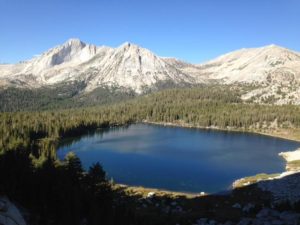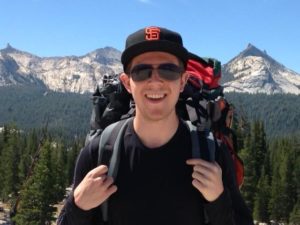- » Homepage
- » Blog
- » What Backpacking Teaches About Quality of Life
What Backpacking Teaches About Quality of Life
Two years ago, my friend Stefano Bartolini, a professor at the University of Siena, invited me to address a Quality of Life conference in Florence. I was honored, but a bit taken aback. It seemed like I was being asked to teach Tiger Woods to play golf. After all, what could I say of value to people in Tuscany, the place that practically invented quality of life. But I wasn’t going to pass up a trip to Florence. My message was simple: whatever you do, don’t listen to those people who want you to copy the Americans! You have found a balanced life here and that’s what matters.
As a writer, speaker, activist and filmmaker, I’ve found that metaphor helps drive home the messages about the importance of quality of life that underlie all of my work. The most popular of these has been “Affluenza,” the idea that we in the rich world suffer from a disease of overconsumption. That metaphor, which I popularized but did not create—there are references to the term as far back as 1815—propelled a popular film and a best-selling book now out in its third edition and in nine languages.
I’d like to propose another metaphor for thinking about achieving and measuring a high quality of life. I think of it as the backpacking theory of wellbeing.
I didn’t realize it at the time but the most important lessons in my life didn’t come from kindergarten, or school at all for that matter. They came from jaunts into the High Sierra mountains of California, beginning when I was 11 years old. That year, and for several thereafter, my father took me backpacking to Yosemite National Park. At first, I looked like a hunchback, bent over under the weight of far too many “necessities”—axe, heavy tent, cans of food—that didn’t turn out to be necessary at all.
By the end of my first year in high school, my father was convinced that we knew what we were doing, and drove my best friend and I to Yosemite to go backpacking on our own. We weren’t yet 15. Every summer afterwards until I left for college, I spent several happy weeks with friends hiking Sierra trails and hitchhiking between trailheads. It was a blessed childhood, full of the best kind of freedom, which my parents gave me instead of a lot of meaningless toys.
Backpacking teaches you about what matters in life. Each time we started a trip, we had to make decisions. That air mattress might be comfortable, but it’s an extra couple of pounds. That stove that made cooking easier but weighed another pound wasn’t necessary when our camps were below timberline.
Dead wood breaks easily when you hit it over a rock so you don’t need an axe. I was learning that you can be happy with very little. More isn’t always better when you must carry it on your back.
You may want the items but you don’t want the weight.
You learn balance from backpacking. It’s a good lesson. Not just for you and me, but for our world. Balance is fundamental to a high quality of life. For the ancient Greeks, it was that fine point between luxury and deprivation. Buddhism encourages its followers to reduce their wants to be happy. Christ commanded his to lighten their material burdens.
But our modern consumer cultures, especially mine, the United States, forget that. For us, bigger is better and biggest is best. If something is a good thing, we surmise, then the more of it the better. There’s no such thing as enough. You might think of our societies as backpackers with loads that keep growing without limit, so we fall over backwards, flailing like upturned beetles, unable to free ourselves, unhappy despite our great wealth.
We are way out of balance, too rich in stuff and hubris, desperately poor in connection, health, compassion, beauty, leisure time and self-reflection. Rich in what we measure, poor in what we don’t. Our Gross Domestic Product tells us that life is getting better—indeed, the grosser the better. But our life satisfaction levels are flat and for many, our mental health is frightening.
When we keep adding to our backpack, the GDP goes up, and it doesn’t matter what we buy. If money is spent on it, then something is a good and counts. An oil spill adds more to GDP—with cleanup and legal bills—than if the oil makes it safely to the refinery. By contrast, so many of greatest satisfactions add nothing to GDP—good health is worth far less than healthcare, for example. It’s a waste of time as far as GDP is concerned.
Poverty, especially amid plenty, is not a source of happiness. Many of our societies are filled with have littles, whose lives would be enhanced by better food, shelter, clothing, education, health care and financial security. But instead, for the past generation, we’ve shifted more and more wealth to the already rich.
To learn the lessons to backpacking, to live in balance, would require much greater equality in our world, but as importantly it demands a change in values, an understanding that the best things in life aren’t things.
On the trails of my youth, we had no iPods or cellphones. A deck of cards provided all the games we needed. We made our own music, with songs around the campfire. We had so little but so much. With lighter packs, we moved gracefully, finding ourselves out of breath only on the steepest grades. We were free. We had time to be, time to think. We had friendship and we walked in beauty, as the Navajos say. We had quality of life.
My life has been devoted to spreading, in one form or another, the lessons of my childhood backpack trips. Most recently, I’ve been involved with the Happiness Alliance (www.happycounts.org), in an effort to promote alternatives to GDP. I’m delighted to be part of ISQOLS, an organization that knows what really matters.
John de Graaf, a documentary filmmaker, is the co-author of AFFLUENZA and WHAT’S THE ECONOMY FOR ANYWAY? and co-founder and communications director the Happiness Alliance. He has taught at The Evergreen State College in Washington State and can be reached at jodg@comcast.net.
Note: portions of this article appeared in Sierra magazine online.
Discussion
John,
This is a thought-provoking review of the Bartolini’s Manifesto for Happiness, which is an amazing piece of work! So much so that it’s inspired me to work on contributing a roundtable discussion on How Can We Use Economic Prosperity to Encourage Well-Being Prosperity for the SCA EXPO next April in Seattle.
I’m not sure I agree with all you say here – but how about in spite of this or exactly because of it – you and I take the Manifesto as a basis for a joint presentation for the next ISQOLS meetings? I suggest we interview Happiness Researchers and make a film to present in Hong Kong. We start by visiting and interviewing Stefano
Warm regards from another paradise,
Leave a comment
Anybody can start or join the conversation by leaving a comment. Please respect the general rules laid out by the ISQOLS Code of Ethics. Your comment will appear immediately after revision by the editorial staff. No HTML code allowed.





